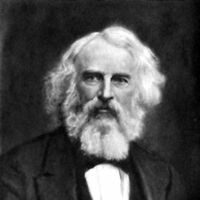Tales of a Wayside Inn: Part 3. Interlude IV.
‘A pleasant and a winsome tale,’
The Student said, ‘though somewhat pale
And quiet in its coloring,
As if it caught its tone and air
From the gray suits that Quakers wear;
Yet worthy of some German bard,
Hebel, or Voss, or Eberhard,
Who love of humble themes to sing,
In humble verse; but no more true
Than was the tale I told to you.’
The Theologian made reply,
And with some warmth, ‘That I deny;
’T is no invention of my own,
But something well and widely known
To readers of a riper age,
Writ by the skilful hand that wrote
The Indian tale of Hobomok,
And Philothea’s classic page.
I found it like a waif afloat
Or dulse uprooted from its rock,
On the swift tides that ebb and flow
In daily papers, and at flood
Bear freighted vessels to and fro,
But later, when the ebb is low,
Leave a long waste of sand and mud.'
‘It matters little,’ quoth the Jew;
‘The cloak of truth is lined with lies,
Sayeth some proverb old and wise;
And Love is master of all arts,
And puts it into human hearts
The strangest things to say and do.’
And here the controversy closed
Abruptly, ere ‘t was well begun;
For the Sicilian interposed
With, ’Lordlings, listen, every one
That listen may, unto a tale
That ‘s merrier than the nightingale;
A tale that cannot boast, forsooth,
A single rag or shred of truth;
That does not leave the mind in doubt
As to the with it or without;
A naked falsehood and absurd
As mortal ever told or heard.
Therefore I tell it; or, maybe,
Simply because it pleases me.’

